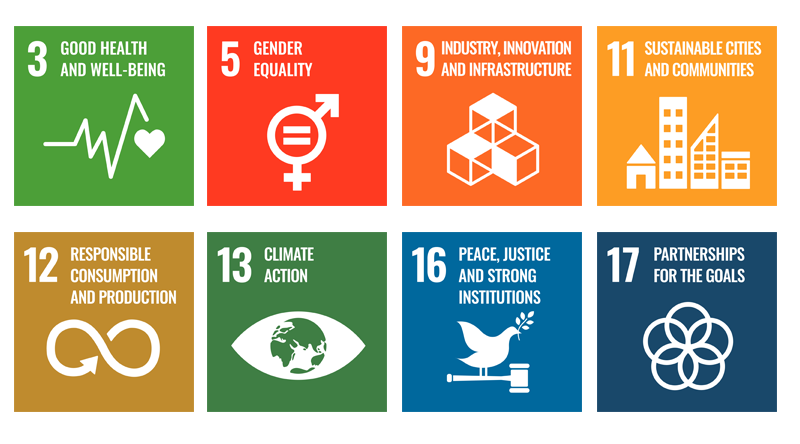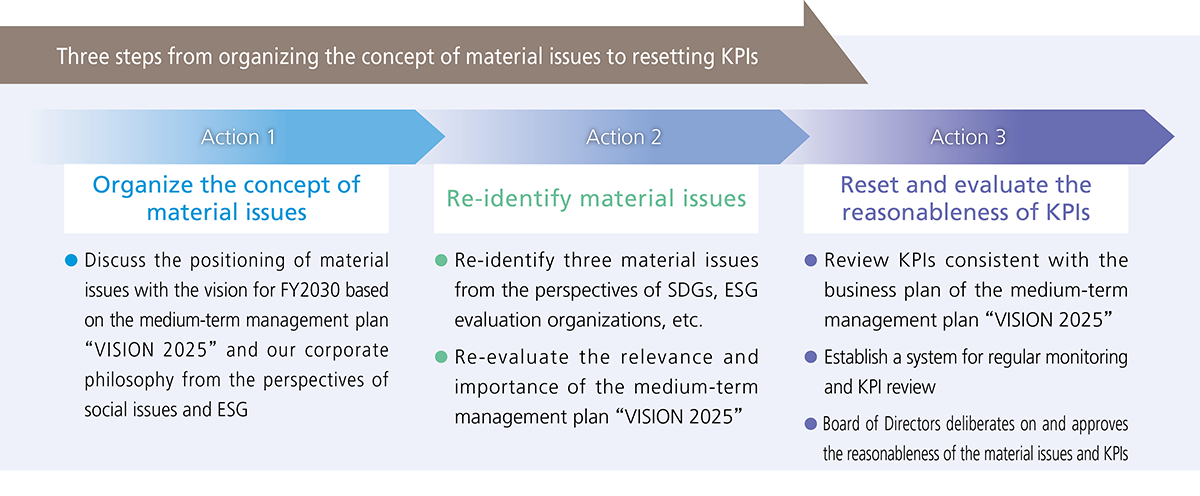Material Issues
Process for Identifying Material Issues
In reviewing material issues in 2023, we considered both the perspective of social issues, such as demands from international trends and initiatives, and our own perspectives, including the business environment, our corporate philosophy, and our mediumterm management plan "VISION 2025."
In identifying material issues, among 17 goals of the Sustainable Development Goals (SDGs) which represent a societal perspective, we chose eight goals that are particularly relevant to the social issues that the Group can contribute to solving as goals that should be addressed on a priority basis.
After deliberation and approval by the Board of Directors, we reidentified three material issues. For each material issue, we set a KPI that is consistent with the business plan to make sure to get the issue solved without fail and monitor progress of the efforts.


We have formulated initiatives for three material issues: (1) Safety & security initiatives, (2) Environmental response, and (3) Sustainable Monozukuri (manufacturing), as well as those for strengthening our corporate base. In addition, we have established sub-material issues, themes and KPI linked to each material issue and the initiatives for "strengthening of the corporate base."

List of Material Issues
For contributing to sustainable societies through business, the JVCKENWOOD Group has identified material issues and initiatives for strengthening the corporate base. We will be formulating KPIs from a mid- to long- term perspective, at the same time developing mechanisms that can be managed globally.
Material issues |
Sub-material issues |
KPI |
SDGs |
|---|---|---|---|
1.Safety & Security Initiatives |
●Creating safe and secure communities ●Reduction and prevention of traffic accidents
|
Value Creation with Safety & Security Sector ・Number of professional radio system units sold Value Creation with Mobility and Telematics Service Sector ・Number of car navigation and display audio system units sold ・Number of dashcam units sold |
|
2.Environmental Response |
●Response to climate change ●Effective Use of Resources |
・Reduction of CO2 emissions (Scope 1 + 2) ・Reduction of CO2 emissions (Scope 3) (Categories 1, 4, 11) ・Waste recycling rate ・ Reduction in waste generation (per unit sales) ・Reduction of plastic consumption volume for containers and packaging ・Reduction in water consumption |
|
3.Sustainable Monozukuri |
●Responsible supply chain ●manufacturing reform ●Accelerating innovation |
・Conducting training on human rights in procurement and logistics-related divisions ・Conducting training on human rights for business partners ・Establishing and operating an external consulting desk ・Obtaining signatures in support of our CSR procurement guidelines when opening a new account ・Requesting the implementation of CSR self-audits by business partners and implementing corrective measures for business partners with identified problems ・Participating in alliances such as RBA and taking advantage of global frameworks |
|
Strengthening the corporate base
It is also important to strengthen our corporate base so that the Group can work together as one to address the three issues.
This is why we set sub-material issues, themes, and KPI to strengthen our corporate base.
Sub-material issues |
Theme |
KPI |
SDGs |
|---|---|---|---|
・Diversity & inclusion |
●Promotion of Women's Active Engagement |
・Ratio of female managers |
|
●Promotion of Foreign Employees Active Engagement |
|||
| ●Promotion of Persons with Disabilities Active Engagement | |||
| ●Initiatives for LGBT+ | |||
| ●Number of recruits | |||
| ● VISION 2025 WS | |||
・Promoting active roles for employees |
●Respect for human rights | - | |
| ●Occupational Safety and Health | |||
| ●Culture/work style reform | |||
| ●Employee health management | |||
| ●Fair Labor-Management Relations | |||
・Strengthening governance |
●Corporate Governance |
・Improve deliberation ・Trainings, off-site meetings, etc. for external directors ・Strengthening diversity ・IT security training attendance rate ・Targeted email training (attendance rate for training for email openers) |
|
●Compliance Code of Conduct |
|||
| ●Information Security |









